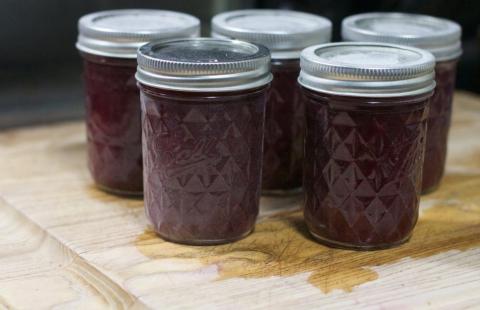Homestead License is NOT required (Exempt)
Starting a homestead food business is a dream of many home cooks. Beginning small, in your own kitchen, with shelf-stable baked goods and other allowed foods is a practical way to try out this venture.
There are some food safety and legal requirements that will help to create a delicious and safe product. This fact sheet, based on New Hampshire Food Protection regulations, can help to get you started. There are 15 cities and towns in New Hampshire that are self-inspecting and may require additional requirements or don’t allow Homestead Operations. See the resource section for a link to a listing of the cities and towns.
You may sell homemade, "homestead" or "cottage" foods in New Hampshire without requiring a Homestead Food License, if you meet certain food safety and sales limit requirements.
1. What kind of foods can I sell?
You can sell foods that do not require Time and Temperature Control for safety (non-TCS foods). In the regulations, these low risk foods are also called non-Potentially Hazardous Foods.

This means you can sell baked goods, candies and foods listed below that do not require refrigeration to keep them safe.
Foods you can sell include:
- Breads, rolls
- Double crusted fruit pies
- Packaged dry products, which include spices and herbs
- Baked goods
- Brownies
- Cookies
- Candy
- Fudge
- Lollipops
- Sweet breads
- Muffins
- Dried herbs
- Roasted whole bean coffee or ground coffee
- Acid foods, including vinegars, mustards, and BBQ sauces (process review required for these foods to determine if they are naturally acid foods or are acidified foods. Acid foods may be produced in a homestead kitchen, acidified foods must be produced in a commercial kitchen). [See Note #1]
- Jams and Jellies (only those made with the exact recipes from the National Center for Home Food Preservation https://nchfp.uga.edu). Exception: Jellies containing peppers must undergo a process review even if they are from the National Center for Home Food Preservation (NCHFP). A process review is also required if you use your own recipe or “tweak” a recipe found on the NCHFP website.
- Baked goods made with produce such as zucchini, pumpkin and banana [Only allowed if they have been tested to be low moisture (water activity less than 0.85). [See Note #2]
- Homemade buttercream or cream cheese frosted baked goods are only allowed if they have been tested and found to have a pH less than 4.6 and water activity less than 0.85.
Note #1: A Process Review is conducted by a food processing authority on each product prior to its being produced by the homestead food processor. The food processing authority declares in writing whether there are biological food safety concerns with the food. Products that are classified as acid foods and foods that have low water activity (below 0.85) can be produced in the homestead.
A list of food processing authorities is available at https://www.dhhs.nh.gov/programs-services/environmental-health-and-you/food-protection/food-processing-plants in the Frequently Asked Questions (FAQ) section.
Note #2: Water Activity Test Moist quick breads like zucchini bread, pumpkin bread and banana bread may be considered TCS foods- needing refrigeration for safety- and cannot be made in a home kitchen, unless they have been tested to be safe. To determine if it is safe, it can be tested for water activity through the NH Public Health Laboratory by calling 603-271-4661.
2. Foods must be sold individually packaged or wrapped and properly labeled.
See #6 below.
3. What foods am I prohibited from making in a homestead kitchen?
Potentially hazardous foods not allowed to be made in a homestead kitchen include processed acidified and low-acid canned foods such as
- Pickles
- Salsa
- Relish
More examples of Potentially Hazardous Foods:
- Meat (beef, pork, lamb)
- Poultry (chicken, turkey, duck)
- Fish - Shellfish and crustaceans
- Eggs
- Milk and dairy products
- Cooked, plant-based foods (e.g., cooked rice, beans, or vegetables)
- Baked potatoes
- Cut fruit
- Cut vegetables and leafy greens
- Mushrooms
- Raw sprouts
- Tofu and soy-protein foods
- Garlic/herb and oil mixtures
4. Where can I sell my food products?
You must sell your food:
- from your own residence
- from your own farm stand
- at a farmer’s market
- at retail food store
For wider distribution, you will need a Homestead Food License.
5. What is the limit on sales before I need to get a license?
You must not exceed maximum gross sales of $35,000. Accurate records should be kept and maintained, including sales records.
For higher sales, you will need a Homestead Food License.
6. How must I label my Homestead Products?
You are required to label your individually packaged products with the following information:
a. Name, Address, Phone Number of the homestead food operation
b. Name of the homestead food product
c. The ingredients of the homestead product, in descending order by weight
d. The name of each major food allergen contained in the food unless it is already part of the common or usual name of the respective ingredient already disclosed in the ingredient statement
Major food allergens:
-
Milk
-
Eggs
-
Fish (e.g., bass, flounder, cod)
-
Crustacean shellfish (e.g., crab, lobster, shrimp)
-
Tree nuts (e.g., almonds, walnuts, pecans, coconut)
-
Peanuts
-
Wheat
-
Soybeans
-
Sesame seeds
e. The label must also state in at least 10-point font
"This product is exempt from New Hampshire licensing and inspection."
f. Product code which identifies the product with a batch number.
Note: this number can be your "baked on" date and "batch number". For example: 1012-2 for the second batch of cookies made on October 12.
7. What equipment and procedures must I have in my residential home kitchen?
- Either a residential model dishwasher and a one-compartment sink OR a two-compartment sink to wash, rinse and sanitize your utensils
- A home refrigerator with a thermometer. Refrigerator temperature maintained at 41o F or less
- No pets in the kitchen during food preparation and packaging
- If bathroom opens directly to the kitchen, it must have a self-closing door and mechanical ventilation
Example Label

Chocolate Chip Cookies batch 01-15
Ashley’s Cookies
2550 Kingston Lane
Anytown, NH 03333
(603)-555-5555
Ingredients: Enriched flour (Wheat flour, niacin, reduced iron, thiamine mononitrate, riboflavin and folic acid), butter (milk, salt), chocolate chips (sugar, chocolate liquor, cocoa butter, butterfat (milk), Soy lecithin (as an emulsifier), walnuts, sugar, eggs, salt, artificial vanilla extract, baking soda.
Contains: wheat, eggs, milk, soy, walnuts
“This product is exempt from New Hampshire licensing and inspection.”
For More Information:
Food Processing Authority University of Maine - Beth Calder
beth.calder@maine.edu 207-581-2791
NH Food Protection Food Safety and Defense Specialist - Royann Bossidy; dhhs.foodprotection@dhhs.nh.gov 603-271-3989
New Hampshire He-P 2300 Sanitary Production and Distribution of Food
NH Self-Inspecting Cities & Towns
Retail Food Establishments - Commercial Kitchens
For More Information, contact UNH Extension Food Safety Specialists:
Mary Saucier Choate - mary.choate@unh.edu, 603-787-6944
Ann Hamilton - ann.hamilton@unh.edu, 603-447-3834
Funding for this project by USDA-NIFA Award 2018-70020-28876.
Created: January 2023, by Mary Saucier Chote, UNH Extension Field Specialist, Food Safety.
Special appreciation to Royann Bossidy of the NH Food Protection Section for her insights and guidance in putting together this 3-part fact sheet series.



